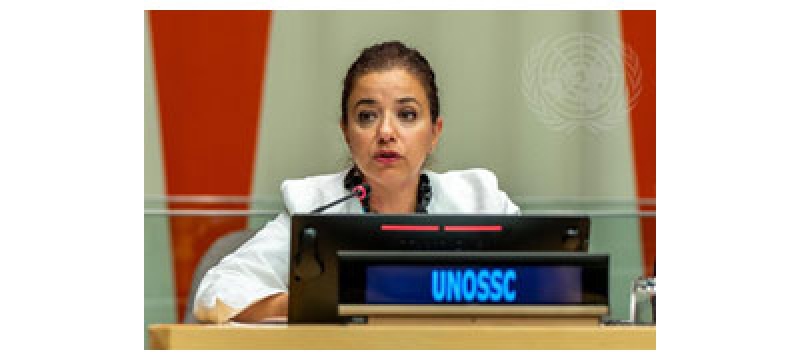- Puppet show enchants Children as Boi Mela comes alive on day 2 |
- DSCC Admin Salam’s drive to make South Dhaka a ‘clean city’ |
- 274 Taliban Dead, 55 Pakistan Troops Killed |
- Now 'open war' with Afghanistan after latest strikes |
- Dhaka's air quality fourth worst in world on Friday morning |
South-South Cooperation Powers 2030 Agenda Progress

With only five years remaining to meet the 2030 Agenda for Sustainable Development, the world finds itself at a critical crossroads. The global pledge to eradicate poverty, protect the environment, and promote prosperity for all remains more urgent than ever. However, progress is inconsistent, and many nations risk falling short.
In the face of global turbulence, South-South and triangular cooperation are emerging as powerful catalysts for hope and transformation. As the 22nd session of the High-level Committee on South-South Cooperation convenes from 27–30 May 2025, under the theme “Accelerating the 2030 Agenda: South-South Cooperation as a Driver for Transformation,” it offers a timely opportunity to galvanise action and assess progress on key frameworks such as the Buenos Aires Plan of Action and the Nairobi and BAPA+40 outcome documents.
South-South Cooperation: A Rising Force for Collective Progress
Across continents, developing countries are collaborating more than ever — sharing resources, expertise, and innovative solutions to address common challenges. Whether tackling poverty, climate change, or inequality, South-South partnerships are helping to reimagine development through mutual respect, local relevance, and shared ambition.
For example, the African Union’s Peace Fund allocated $7 million to support stabilisation in Burkina Faso and the Democratic Republic of the Congo, reinforcing the role of regional solidarity. Similarly, Mexico has launched job creation and food security initiatives in Honduras and El Salvador, benefiting over 40,000 people, while Brazil and India have partnered on satellite technology to monitor deforestation and enhance food production.
Harnessing Digital Innovation for Sustainable Impact
The digital divide remains a pressing issue, with over 2.6 billion people — many of them women and girls — still offline and excluded from essential services. South-South cooperation is actively addressing this gap. Countries in the Global South are deploying digital tools to leapfrog barriers to development.
AI applications now support crop forecasting in Kenya, climate early warnings in Dominica, multilingual learning platforms in India, and public health systems in Brazil. Rwanda is leveraging AI to boost financial access in rural areas.
Platforms like South-South Galaxy and the South-South and Triangular Cooperation Solutions Lab are fostering knowledge exchange and scaling successful innovations in e-governance, mobile banking, and digital education.
Financing and Institutional Strengthening: Scaling What Works
The UN Fund for South-South Cooperation (UNFSSC) and partner trust funds have scaled innovative, homegrown development projects worldwide. Over 70 countries have benefited from its initiatives, implemented with 45 UN entities.
Under the India-UN Development Partnership Fund, more than 75 projects have been executed in 56 developing nations, focusing on renewable energy, climate resilience, and public health — with swift response during the COVID-19 pandemic.
The IBSA Fund (India-Brazil-South Africa) has delivered over 40 transformative projects, from building health centres in Haiti to enhancing food systems in Sierra Leone. Meanwhile, the G77/Pérez-Guerrero Trust Fund (PGTF) has supported 400 projects across 140 countries since 1983 — focusing on energy, trade, and women’s empowerment.
Triangular Cooperation: Amplifying Global Reach
Triangular cooperation complements South-South efforts by bringing together developing countries, traditional donors, and international organisations. This model blends local ownership with global expertise.
The UNOSSC PLINK initiative, supported by the Republic of Korea, is helping communities in Cambodia, Lao PDR, Thailand, and Viet Nam co-create sustainable solutions to the water-energy-food nexus, addressing climate threats and rapid urbanisation.
To institutionalise such efforts, the UNFSSC has launched a Triangular Cooperation Window, supported by Colombia, Morocco, Portugal, and Spain. This facility is mobilising expertise and resources across sectors and continents.
A Global Call to Action
As the international community gathers for the 22nd session of the High-level Committee and prepares for the 4th International Conference on Financing for Development, the message is clear: South-South and triangular cooperation must be central to our global development efforts.
These partnerships are not just about aid — they are about mutual empowerment, local solutions, and lasting transformation. By investing in knowledge sharing, capacity building, and inclusive governance, we can harness these powerful tools to achieve the Sustainable Development Goals.
Let us move forward — together — to build a fairer, greener, and more inclusive world.
Dima Al-Khatib is the Director of the United Nations Office for South-South Cooperation (UNOSSC). With over 25 years of experience in sustainable development, she previously served as the UNDP Resident Representative in Moldova and held senior positions in Libya, Kuwait, and the UNDP Regional Hub in Amman. She holds degrees in Environmental Health from the American University of Beirut and the University of Bordeaux II.

